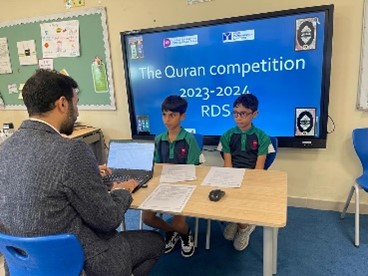
Islamic Studies
We offer Islamic Studies to all Muslim children attending the school from Year 1 onwards. In the lower years the curriculum addresses numerous areas of a child’s development. Short Surahs, Hadeeth, Duaa, Nasheeds, sciences, development of personal attitudes, acknowledging environmental issues and developing social skills are all integrated in the Islamic Curriculum. Also included as part of the curriculum are trips, Islamic academy and ECAs to improve Qur’an recitation, Seerah, Aqeedah and Ibadah, special events that are linked to Islamic Education helping children progress, especially with the transference of Islamic knowledge to the practicalities of daily life – including the etiquettes of entering a Mosque and how to conduct themselves during prayer times. We celebrate all of the Islamic events in the schools and encourage students and parents to be in the center of all these events, e.g. Ramadan iftar, Eid assembly, prayer’s week and so many events organized with our RDS community.
In the Islamic department we encourage children to take responsibility for their own learning, to be involved as far as possible in reviewing the way they learn, and to reflect on how they learn.
The mission of Islamic Education is to pursue excellence in teaching, learning, and research in the academic study of Islam as an implementation of the vision for Muslim education and multiculturalism. In the Islamic Education Department we are working very hard to achieve the following goals:
- Provide students with an opportunity to broaden, deepen, and enrich their understanding of Islam, based on authentic sources and comparative methods of study.
- Develop students’ understanding of the position of the Qur’an in Islam.
- Provide students with general understanding of Islam and How to be a Muslim.
- Develop students’ awareness of the history of Islam.
- Promote the appreciation of Islamic ethics and etiquette through a code of personal practice.
- Prepare students to contribute to both Muslim and multi-cultural environments.
- Equip students with the skills they need to pursue life-long learning.
- Develop critical and analytical thinking in students.
- Provide students with an opportunity to develop the capacity for independent learning.
- Enable students to develop their academic potential.










